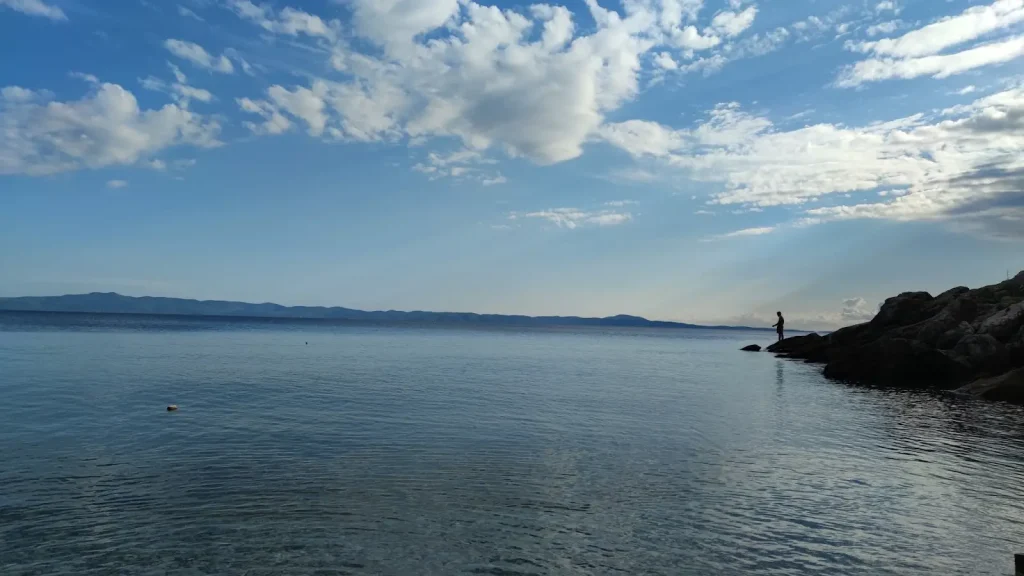Croatia, great for a 2-week holiday, but a nightmare for full-time living unless you are very rich, so the perceived wisdom goes. The Croatian dream is to live in Croatia with a nice income from abroad, as many foreigners and remote workers do. For Croatians, if I read the comments in my recent video, Croatia is the Best Place to Live: 8 Reasons Why (see below), salaries are too low and people are forced to emigrate in search of a better life.
While there is definitely an element of truth to this, it got me thinking. The era of remote work is here, and the workplace is increasingly global, with a labour shortage for many skills. It doesn’t matter if you are from Boston or Bangladesh if you have the skills, desire, and work ethic, and are able to work remotely online. And while it is certainly true that salaries in Croatia are low, what about the opportunities that the global online marketplace offers? If foreigners can find ways to live in Paradise and work remotely, why not locals? Curious, I posted this on my Facebook and LinkedIn:
Do I know many Croats who are living in Croatia, but working remotely for international companies who would be interested in being part of a TCN interview series showcasing living in Croatia but earning online, including advice to others on how to get started? It could be an interesting series. If interested, contact me on [email protected] Subject Remote Croatia.
Some 15 emails – and several inspiring stories – later, and I think we have the makings of what could be a rather interesting series, Croats Living in Croatia & Earning Abroad. Next up in the series, Stjepan Mijat Zaninović, from the village of Zastražišće on Hvar.
My name is Stjepan Mijat Zaninović. I’m from Zastražišće, a small village on Hvar island.
And if you aren’t from Croatia, the line above probably made you feel something like this.
But from this point, there won’t be many č,ć,ž,š, and other elvish letters. I hope my story helps you realize what it takes to make it in Croatia. And by the end of the story, you’ll see why donkeys are sacred animals in Dalmatia.
You managed to achieve the Croatian dream – living here and working for international companies. Tell us how you did it.
The short answer is that I had no other choice. But that’s not how interviews work, so I have to take you back to 2017.
I was a night receptionist in a 4* hotel in Split and karate sensei.
After finishing high school and dropping out of college, I was destined to spend my life in positions no one else wanted. I was ok with that. But with a job no one wants comes the boss no one wants. And I’m not the type of person who sits and complains. I complain a lot, but I can’t sit still. So instead of crying over my destiny to work for the minimum wage, I decided to cash in on the only other skill I had. Something I call connectivity, but for the sake of avoiding elvish, let’s call it writing for now.
Nights in a hotel were long, so I decided to write a book to honor my path, mission, and the lady who made that path brighter. The one who made my mission clear. That’s how “The Girl With the Fire in Her Hair” was born.
But this is Croatia, and I’m no one, so no one wanted to publish my book.
So I started looking for ways to make money through writing, which led me to Freelancer.com. A platform where cheap people go to find affordable talents to take care of gigs no one else wants. But I was happy with every project I could get because I was finally getting paid to write. I worked a week for a dollar, but I made money online doing something I liked.
Soon after, I started writing landing pages for natural supplements and taking care of social media for one American holistic brand. I was underpaid, but I was happy.
Today, 500+ landing pages and 3,000,000 words of blogs later, I’m still underpaid and happy. I’m also self-employed and working almost exclusively with foreign companies. I just wrapped up a long-form sales letter for a tantric retreat in Costa Rica. Next week, I’ll start doing cold email outreach for a growth agency with an office in Chicago. But I’m an introvert like many copywriters. Blowing my own horn isn’t really my thing, so let’s move to the next question.
Looking for jobs based in Croatia can be a challenging task. How challenging was it for you to get where you are today – it must have taken a lot of determination and rejection.
It was the ultimate test of willpower, partially because I was ignorant (and poor as a mouse). It took me 2 years to realize that I wasn’t a writer but a copywriter. And I couldn’t afford any mentors, so I had to do everything the hard way. I was bidding for numerous jobs left and right. I won some but lost many more. Every time a prospect would ghost me felt like a head kick. I hate getting rejected. I wanted to give up many times. Until October 2021, I was working full-time and writing full-time. Working 2 jobs drains a person.
But remember, I’m a stubborn Dalmatian donkey.
So now I’m a proud owner of a marketing agency Ihneumon Connectivity. Now, I cooperate closely with 6,7, and 8-figure companies. I even sometimes help other copywriters get to the next level.
3. If you can do it, presumably others can too. Are you aware of others who have had similar success, but maybe in different industries?
If I can do it, anyone can.
I’m focused on foreign markets, so I’m not networking with Croats that much (and being 100% introverted doesn’t help). However, I heard about many people from Croatia who “made it” without leaving Croatia.
So yeah, it’s possible. Difficult, but possible. Even though someone with enough money to pay for mentors and enough friends to help them can climb much faster than I have. Being one of the stars of the mentorship program by Stefan Georgi and Justin Goff (huge names in direct response copywriting) changed my life. That and the fact that I was too stupid to give up brought me where I am today.
4. What is the general feeling among people in Croatia today? Is it possible to have a good life here, or is the grass greener on the other side?
I won’t go all political here, but I have to say that one of the first articles I’ve ever written was “Croatia – the Rotten Diamond.” Croatia is the best place in the universe in many ways, but it’s terrible at the same time.
I’d say that the general feeling today is that honest work almost isn’t enough to survive in Croatia while being an Uhljeb (let’s say a parasite) is the Croatian Dream. The problem is that some people in Croatia live great, relaxed lives while most struggle to make ends meet. That creates gaps between people and divides us. But in the end, I guess that’s all part of the bigger plan. Divide and conquer is one of the most powerful techniques in every aspect of life. Yet, let’s jump to the next question before I get myself in trouble by revealing painful truths about Croatia.
5. Apart from corruption and nepotism, low wages are often cited as a reason to emigrate. But with the remote work revolution, as your example has shown, as well as the influx of many foreign workers to the likes of Rimac and Infobip for example, show that a good quality of life IS possible in Croatia. What are your thoughts on that?
I agree. Good quality of life is possible in Croatia. But even when you work remotely, you’re still in this rotten diamond. That means you still need to deal with prices that fit Scandinavian countries more than Balkan. That means you still have to deal with injustice on every corner. And I’m not worried about myself. I’ll deal with it. Other young people will deal with it (or leave the country).
I’m worried for my mom and dad. I’m worried for people who must work until they drop dead because we need to feed all the parasites. I hate to imagine the future in the country that has repaired 6 (in letters – SIX) houses since the earthquake 2 years ago.
*deep breath*
Let’s move on. There’s no need to ruin this beautiful day.
6. What advice do you have for others who would like to stay in Croatia, but have no idea where or how to find a possible remote work job or business as you have managed to do?
I could write a book of tips on that topic, but I don’t want to waste everyone’s time, so here are some bullets.
- Network – Take this from the demigod of introverts; you can’t make it alone. It’s simply impossible.
- Keep honing your skills – But it’s impossible to make it if you suck at what you do.
- Keep learning new skills – And if you decide that there’s nothing new to learn, you won’t stay on top for long. Last month I learned how to use ClickFunnels. In the past 6 months, I worked in 7 new niches. You must be hungry all the time. If there’s more to be done, you’ve done nothing yet.
- Become a donkey – this one is the most important. Without this one, everything else is futile. Donkeys are noble animals, but they’re stubborn as hell. You must be so determined that nothing can stop you. And I know that’s true everywhere, not just in Croatia.
7. Three reasons you decided to stay in Croatia, and the one thing you would like to change in this country.
I’ll start with things I’d love to change because I want to finish this in a happy tone. I’d change the fact that Croatia has 555 local government units while the UK has 333. Can you imagine the number of parasites we need to feed?
I’d change the fact that the entire country depends on the weather. And not in a good way. I’d love to see more windmills, solar panels, and stuff. But sadly, we depend on the weather in a silly way. If the weather during Summer isn’t perfect (or there’s some virus in the air), there’s no tourism. If there’s no tourism, well…
Croatia earns most of its money from tourism. More than any other country in the EU. Tourism brought a staggering 21% of the Croatian GDP in 2019. I heard 2022 was even better, so I don’t want to imagine what would happen if tourists decide to avoid this Rotten Diamond.
Now, let’s move to the reasons why I decided to stay:
- My mom would cry forever. My brother is in Ireland. Losing 2 of her kids would probably kill her.
- My wife wanted to go to Ireland. I wanted to go to Japan. The weather in Ireland sucks, and Japan is too expensive. For now, Stari Grad is home.
- I feel deeply connected to Hvar. My soul belongs here.
I appreciate this chance to share my story, Paul.
You can connect with Stjepan on LinkedIn and on Facebook.
****
Thanks Stjepan, very inspiring, and congratulations on all your success.
You can follow the rest of this series in the dedicated TCN section here.
If you would like to contribute your story to this series, please contact [email protected] Subject Remote Croatia.
****
What is it like to live in Croatia? An expat for 20 years, you can follow my series, 20 Ways Croatia Changed Me in 20 Years, starting at the beginning – Business and Dalmatia.
Follow Paul Bradbury on LinkedIn.
Subscribe to the Paul Bradbury Croatia & Balkan Expert YouTube channel.
Croatia, a Survival Kit for Foreigners is now available on Amazon in paperback and on Kindle.












